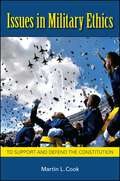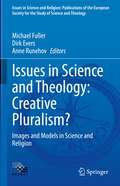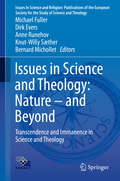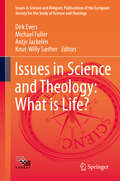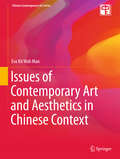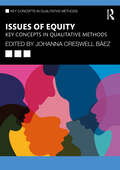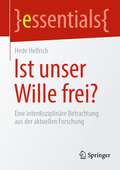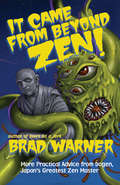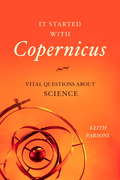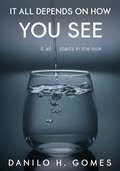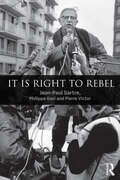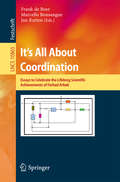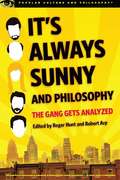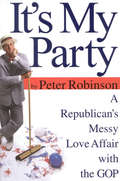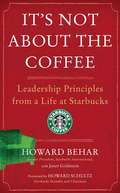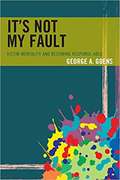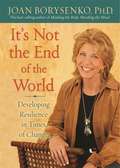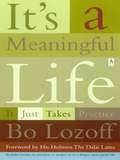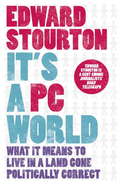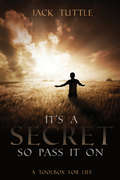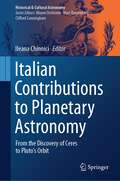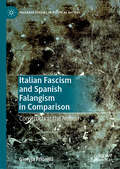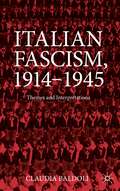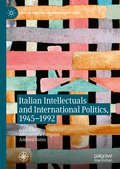- Table View
- List View
Issues in Military Ethics: To Support and Defend the Constitution
by Martin L. CookReflecting on a seventeen-year career teaching at military educational institutions of the Air Force, the Army, and the Navy, Martin L. Cook finds a powerful but underappreciated basis for military ethics in the oath to the Constitution that members of the armed services pledge. In Issues in Military Ethics, Cook considers the role of airpower in counterinsurgency war and the place of robotic weapons systems on the battlefield, but he also looks beyond ethics in the conduct of war to issues arising in military life generally. He addresses a range of other issues with pressing contemporary relevance, including civil-military relations, ethics education, and religion, in particular the ascendency of evangelical Christianity in military culture. This volume serves as an important resource for scholars, members of the armed services, and educators alike.
Issues in Science and Theology: Images and Models in Science and Religion (Issues in Science and Religion: Publications of the European Society for the Study of Science and Theology #6)
by Dirk Evers Michael Fuller Anne RunehovThis book brings together selected papers from scientists, theologians and philosophers who took part in the 2021 conference of the European Society for the Study of Science and Theology based in Madrid, Spain. The contributions constitute a cutting-edge resource for considering questions from interdisciplinary perspectives, covering both the crucial role played by images and models in our thinking and also the limitations which are inherent in these linguistic devices. Questions addressed include: Can this use of images and models generate a creative pluralism, enabling us to think outside the disciplinary silos which are a feature of academic discourse? Can they enable fruitful, synergistic, interdisciplinary conversations? This book will appeal to students and academics alike, particularly those working in the fields of philosophy, theology, ethics and the history of science.
Issues in Science and Theology: Transcendence and Immanence in Science and Theology (Issues in Science and Religion: Publications of the European Society for the Study of Science and Theology #5)
by Dirk Evers Michael Fuller Anne Runehov Knut-Willy Sæther Bernard MicholletThis book addresses a variety of important questions on nature, science, and spirituality: Is the natural world all that there is? Or is it possible to move ‘beyond nature’? What might it mean to transcend nature? What reflections of anything ‘beyond nature’ might be found in nature itself? Gathering papers originally delivered at the 2018 annual conference of the European Society for the Study of Science and Theology (ESSSAT), the book includes contributions of an international group of scientists, philosophers, theologians and historians, all discussing nature and what may lie beyond it. More than 20 chapters explore questions of science, nature, spirituality and more, includingNature – and Beyond? Immanence and Transcendence in Science and ReligionAwe and wonder in scientific practice: Implications for the relationship between science and religionThe Cosmos Considered as a Moral InstitutionThe transcendent within: how our own biology leads to spiritualityPreserving the heavens and the earth: Planetary sustainability from a Biblical and educational perspective Issues in Science and Theology: Nature – and Beyond will benefit a broad audience of students, scholars and faculty in such disciplines as philosophy, history of science, theology, and ethics.
Issues in Science and Theology: What is Life?
by Dirk Evers Michael Fuller Knut-Willy Sæther Antje JackelénThis book explores the concept of Life from a range of perspectives. Divided into three parts, it first examines the concept of Life from physics to biology. It then presents insights on the concept from the perspectives of philosophy, theology, and ethics. The book concludes with chapters on the hermeneutics of Life, and pays special attention to the Biosemiotics approach to the concept. The question 'What is Life?' has been deliberated by the greatest minds throughout human history. Life as we know it is not a substance or fundamental property, but a complex process. It is not an easy task to develop an unequivocal approach towards Life combining scientific, semiotic, philosophical, theological, and ethical perspectives. In its combination of these perspectives, and its wide-ranging scope, this book opens up levels and identifies issues which can serve as intersections for meaningful interdisciplinary discussions of Life in its different aspects. The book includes the four plenary lectures and selected, revised and extended papers from workshops of the 14th European Conference on Science and Theology (ECST XIV) held in Tartu, Estonia, April 2012.
Issues of Contemporary Art and Aesthetics in Chinese Context
by Eva Kit Wah ManThis book discusses how China's transformations in the last century have shaped its arts and its philosophical aesthetics. For instance, how have political, economic and cultural changes shaped its aesthetic developments? Further, how have its long-standing beliefs and traditions clashed with modernizing desires and forces, and how have these changes materialized in artistic manifestations? In addition to answering these questions, this book also brings Chinese philosophical concepts on aesthetics into dialogue with those of the West, making an important contribution to the fields of art, comparative aesthetics and philosophy.
Issues of Equity: Key Concepts in Qualitative Methods (Key Concepts in Qualitative Methods)
by Johanna Creswell BáezIssues of Equity: Key Concepts in Qualitative Methods provides practical and theoretical tools to advance equity in qualitative research, featuring chapters on research methods, concepts, and populations. The short chapters offer guidance for researchers, students, and practitioners to conduct ethically sound and transformative qualitative research focused on diverse perspectives and social justice principles.This book covers a wide range of topics essential to equity in qualitative research. Methods like testimonio research, person-centered interviewing, black liberation research, and liberatory participatory action research provide ways to amplify marginalized voices, promote collaboration, and create knowledge grounded in participants’ lived experiences. Key concepts such as transformative-emancipatory praxis, critical reflexivity, and counternarratives offer innovative frameworks for analyzing power dynamics in qualitative research. Chapters on research with culturally diverse populations, within the Lesbian, Gay, Bisexual, Transgender, Queer and Questioning, Intersex, Asexual, and Two-Spirit (LGBTQIA2S+) community, and through Diné (Navajo) Philosophy and Indigenous Ways of Knowing highlight the importance of uplifting cultural identities and ways of knowing... The book’s main findings emphasize the importance of integrating social justice principles in all phases of research, encouraging critical reflexivity, and understanding context-specific challenges to conducting equitable qualitative research studies.Aimed at qualitative researchers, students, and practitioners, the book provides practical and theoretical tools to center equity in research design, implementation, and analysis.
Ist unser Wille frei?: Eine interdisziplinäre Betrachtung aus der aktuellen Forschung (essentials)
by Hede HelfrichIm Alltag sind wir oft davon überzeugt, verschiedene Handlungsmöglichkeiten zu haben und uns „frei“ für eine der Möglichkeiten entscheiden zu können. Dagegen wird von Vertretern der Hirnforschung der freie Wille als Irrglaube deklariert. Unser Verhalten beruhe auf Gehirnfunktionen, die ihrerseits durch unsere genetische Ausstattung und unsere Umwelterfahrungen geprägt sind. In diesem essential wird argumentiert, dass ein freier Wille nicht gegen Naturgesetze verstößt und dass die Determiniertheit des menschlichen Handelns durch Anlage und Umwelt Spielräume für selbstbestimmtes Handeln lässt. Es wird gezeigt, dass es keinerlei empirischen Nachweis dafür gibt, dass der freie Wille nicht existiert.
It Came from Beyond Zen!: More Practical Advice from Dogen, Japan's Greatest Zen Master
by Brad WarnerVol. 2 of Brad Warner’s Radical but Reverent Paraphrasing of Dogen’s Treasury of the True Dharma EyeIn Japan in 1253, one of the great thinkers of his time died — and the world barely noticed. That man was the Zen monk Eihei Dogen. For centuries his main work, Shobogenzo, languished in obscurity, locked away in remote monasteries until scholars rediscovered it in the twentieth century. What took so long? In Brad Warner’s view, Dogen was too ahead of his time to find an appreciative audience. To bring Dogen’s work to a bigger readership, Warner began paraphrasing Shobogenzo, recasting it in simple, everyday language. The first part of this project resulted in Don’t Be a Jerk, and now Warner presents this second volume, It Came from Beyond Zen! Once again, Warner uses wry humor and incisive commentary to bridge the gap between past and present, making Dogen’s words clearer and more relevant than ever before.
It Started with Copernicus
by Keith ParsonsA unique approach to the philosophy of science that focuses on the liveliest and most important controversies surrounding scienceIs science more rational or objective than any other intellectual endeavor? Are scientific theories accurate depictions of reality or just useful devices for manipulating the environment? These core questions are the focus of this unique approach to the philosophy of science. Unlike standard textbooks, this book does not attempt a comprehensive review of the entire field, but makes a selection of the most vibrant debates and issues.The author tackles such stimulating questions as: Can science meet the challenges of skeptics? Should science address questions traditionally reserved for philosophy and religion? Further, does science leave room for human values, free will, and moral responsibility?Written in an accessible, jargon-free style, the text succinctly presents complex ideas in an easily understandable fashion. By using numerous examples taken from diverse areas such as evolutionary theory, paleontology, and astronomy, the author piques readers' curiosity in current scientific controversies. Concise bibliographic essays at the end of each chapter invite readers to sample ideas different from the ones offered in the text and to explore the range of opinions on each topic.Rigorous yet highly readable, this excellent invitation to the philosophy of science makes a convincing case that understanding the nature of science is essential for understanding life itself.
It all depends on how you see: It all starts in the look
by Ana Cristina Rodrigues Gomes Danilo Henrique GomesIn "It all depends on how you see", the author brings a different way of seeing the world and the problems of everyday life. Based on theology and phenomenology, a famous line of philosophical thought, the reader can reprogram his mind to enjoy life in an uncomplicated way. Find in this book related topics: - Phenomenology (line of thought of philosophy) - To the power of optimism and pessimism - Cognitivism (line of thought of psychology) - To the power of conviction - The subjectivity - The right way to see the world And much more! The old thoughts and theories of scientists such as William James, Edmund Husserl, Jean-Paul Sartre, and others are analysed in a well-explained and somehow funny way, and the way in which they are applied in everyday life is set forth in the pages of this work. Your gaze commands your way of living life and it can be modified, so immerse yourself in this book and change your way of seeing the world.
It is Right to Rebel
by Jean-Paul Sartre Philippe Gavi Pierre VictorThe early 1970s were a crucial period in the political and intellectual climate of France. The newspaper Libération was founded in the wake of the protest movements of 1968, and the country was gripped by industrial, political and civil unrest on a huge scale. Behind all this were deep debates about the nature and justification of revolt, class conflict and consciousness, and the nature of what it meant to be free.It is Right to Rebel, available in English for the first time with a new Preface by Philippe Gavi, is a fascinating discussion between three thinkers about this extraordinary period. The book comprises extensive conversations between the philosopher and writer Jean-Paul Sartre, journalist and co-founder of Libération Philippe Gavi, and political radical and Maoist Pierre Victor, all conducted between 1972 and 1974. In these conversations Sartre works out his relation between socialism and freedom, providing fascinating background to his tortured relationship with the French Communist Party. Together with his interlocutors they explore and debate what should be the basis of ethics, the nature of oppression and racism, including immigration, the Arab-Israeli conflict, the Chilean military coup in 1973 and more. A recurring theme is their exploration of two major questions: what should ethics be based on, and what makes for a revolutionary?It is Right to Rebel is a fascinating insight into the philosophical and political background to Sartre's thought as well as the two lesser-known figures of Gavi and Victor, who play political foil to Sartre's measured philosophical stance. It is a fascinating, rich new resource for anyone studying Sartre, political theory, and French politics and political history.
It's All About Coordination: Essays Dedicated To Farhad Arbab On The Occasion Of His 65th Birthday (Theoretical Computer Science and General Issues #10865)
by Marcello Bonsangue Frank De Boer Jan RuttenThis Festschrift volume has been published to celebrate the lifelong scientific achievements of Farhad Arbab on the occasion of his retirement from the Centre of Mathematics and Computer Science (CWI).Over the years Farhad Arbab has sucessfully been engaged in scientific explorations in various directions: Software Composition, Service Oriented Computing, Component-based Software, Concurrency Theory, Coordination Models and Languages, Parallel and Distributed Computing, Visual Programming Environments, Constraints, Logic and Object-Oriented Programming.Farhad Arbab has shaped the field of Coordination Models and Languages. His insight that it is all about exeogeneous coordination gave rise to the striking elegance and beauty of Reo: an exogenous coordination model based on a formal calculus of channel composition. Reo has been extremely successful and is having a great impact in many of the areas mentioned above.The present volume collects a number of papers by several of Farhad’s close collaborators over the years.
It's Always Sunny and Philosophy: The Gang Gets Analyzed
by Robert Arp Roger HuntPhilosophers wittily and expertly uncover amazing philosophical insights from the endlessly fascinating TV show, It's Always Sunny in Philadelphia.Littmann shows how the values of the gang are the same as those of Homeric heroes. <P><P>Ketcham argues that the Church should make Charlie a saint, partly because It's Always Sunny is "all about free will." Hamer shows how closely the gang's activities comply with the scientific method. Alkema and Barkman analyze the way the gang perceives happiness and how they try to get it. Leonard proves beyond doubt that the game of Chardee MacDennis reveals everyone's unconscious desires. King examines the morality of the gang's behavior by the standard of how they respond to extreme suffering. Chambers agrees that each of the five central characters is a terrible person, but argues that, given their circumstances, they are not truly to blame for their actions. Tanswell demonstrates that many of the gang's wrong actions result not from immoral motives but from illogical thinking. Aylesworth uses examples from It's Always Sunny to bring out some of the moral problems with real consent to sex. Jones reveals that Nietzsche foresaw everything the gang at Paddy's Pub would do.
It's My Party: A Republican's Messy Love Affair with the GOP
by Peter RobinsonMy views were Republican, I voted Republican, I worked in a White House that was Republican. I had to admit it. I was as Republican as they come. That may have been obvious to you, but it came as a rude awakening to me. IT'S MY PARTY After Ronald Reagan, after George Bush, after Bill Clinton, where is the Republican Party headed today? This is exactly the question former White House speechwriter and special assistant to the president Peter Robinson asked himself--and the answers he discovered surprised even him. IT'S MY PARTY is part irreverent memoir, part "travel diary," and part impassioned call to arms. In it, Robinson shows just what the GOP has got going for it--and how its most triumphant years are yet to come. Along with Robinson's personal, and sometimes hilarious, lifelong relationship with Republicanism, IT'S MY PARTY takes us through history and geography to trace the party's roots. It pushes the hot buttons of headline issues that other political professionals are afraid to touch. It introduces us to both the party's leaders and its foot soldiers, from George Bush, Sr. to Rep. Chris Cox, from Newt Gingrich to Bret Schundle
It's Not About the Coffee: Leadership Principles from a Life at Starbucks
by Howard Behar Janet Goldstein"At Starbucks, the coffee has to be excellent, from the sourcing and growing to the roasting and brewing. The vision has to be inspiring and meaningful. Our finances have to be in order. But without people, we have nothing. With people, we have something even bigger than coffee." During his many years as a senior executive at Starbucks, Howard Behar helped establish the Starbucks culture, which stresses the importance of people over profits. He coached hundreds of leaders at every level and helped the company grow into a world-renowned brand. Now he reveals the ten principles that guided his leadership--and not one of them is about coffee. Behar starts with the idea that if you regard employees and customers as human beings, everything else will take care of itself. If you think of your staff as people (not labor costs) they will achieve results beyond what is thought possible. And if you think of your customers as people you serve (not sources of revenue) you'll make a deep connection with them, and they'll come back over and over. This approach has been integral to Starbucks from the start, and remains so today. Behar shares inside stories of turning points in the company's history as it fought to hang on to this culture while growing exponentially. He discusses the importance of building trust, facing challenges, daring to dream, and other key principles, such as: Know Who You Are: Wear One Hat. When organizations are clear about their values, purpose, and goals, they find the energy and passion to do great things. Think Independently: The Person Who Sweeps the Floor Should Choose the Broom. We need to get rid of rules--real and imagined--and encourage the independent thinking of others and ourselves. Be Accountable: Only the Truth Sounds Like the Truth. No secrets, no lies of omission, no hedging and dodging. Take responsibility and say what needs to be said, with care and respect. Take Action: Think Like a Person of Action and Act Like a Person of Thought. Find the sweet spot of passion, purpose, and persistence. "It's all about the people" isn't an idea, it's an action. Feel, do, think. Find the balance, but act. Behar believes that as work becomes less hierarchical and as the world economy becomes more and more about relationships and connecting, the principles of personal leadership are more important than ever. This book will show you the way.
It's Not My Fault: Victim Mentality and Becoming Response-able
by George A. GoensAll children have hopes and dreams. Their innocent optimism from their early years to working their way through school is inspiring. The responsibilities of educators and parents are to help children be ‘response-able’ in facing the challenges of life. A victim mentality eliminates any hope of successfully meeting their aspirations and dreams. <p><p> Children face obstacles -- some are daunting and others the normal ups and downs of childhood. Parents and others have an obligation to help children grow into maturity and learn that they can act in positive ways in good as well as in hard times. To reject the ability to live a life they have imagined results in a life lost, along with its potential and possibilities. <p><p> To be successful, children cannot adopt a victim mentality. When confronted with challenges, character matters -- responding effectively to address life’s challenges. Schools must teach character development in an environment that holds children responsible and accountable. We all have only one life to live and we are able to respond to achieve an imagined life.
It's Not the End of the World: Developing Resilience in Times of Change
by Joan BorysenkoThe world is in crisis, but you don't have to be. We all know resilient people who bounce back from hardship and create their best lives. That's the promise of change. Other people stress out and melt down, losing hope and health. That's the danger in times of change. The good news is that resilience isn't a genetic gift for the lucky few. It's an easily understood skill that anyone can practice and master. Resilient people face reality head on, take action, find deeper meaning in life, laugh often, and are masters of improvisation. A new kind of natural selection is already having its way with us. Hopeful, stress-hardy people will rule the world. And as change and uncertainty escalate, those prone to stress will be less able to compete. This book by Joan Borysenko is the key you need to step into a bold new future that works for us all.
It's a Meaningful Life
by Bo LozoffLozoff, whom the Utne Reader has named one of the nation's 100 Spiritual Visionaries, has written a compelling criticism of the anomic era in which we live. In our age, Lozoff writes, we don't take the time to enjoy everyday pleasures, such as having dinner with family or watching the sun set. "Our civilization", he writes, "is in serious trouble": consumerism runs rampant, and people are increasingly estranged from one another. It is his contention that integrating simple spiritual practices into our daily lives can help make life more satisfying and meaningful. Lozoff does not prescribe certain spiritual practices that he thinks every person ought to undertake. Rather, drawing on a wealth of traditions from Tibetan Buddhism to Hasidic Judaism, the author presents an appealing pastiche of practices from prayers to breathing exercises. Readers will learn about classic mantras (Om mani padme hum, the Tibetan Mantra of Compassion and the Jesus Prayer) and more contemporary ones, such as "No hardfeelings". But Lozoff's daily practices are not limited to the obviously spiritual -- in his discussion of "living simply", he urges readers to
It's a PC World
by Edward StourtonAlmost all of us have a hobby horse we like to ride into battle against Political Correctness, and yet the PC phenomenon just seems to keep on growing, touching every facet of our lives from our pleasures to our politics. Why? Could it be that this much derided scourge of the modern world contains a germ of goodness? Edward Stourton finds examples in all walks of life ? and explodes a few myths along the way. His witty and thought-provoking manoeuvres through the pros and cons of PC are both entertaining and at times unexpectedly disturbing.
It's a PC World
by Edward StourtonAlmost all of us have a hobby horse we like to ride into battle against Political Correctness, and yet the PC phenomenon just seems to keep on growing, touching every facet of our lives from our pleasures to our politics. Why? Could it be that this much derided scourge of the modern world contains a germ of goodness? Edward Stourton finds examples in all walks of life – and explodes a few myths along the way. His witty and thought-provoking manoeuvres through the pros and cons of PC are both entertaining and at times unexpectedly disturbing.
It's a Secret, So Pass it On
by Jack L. TuttleInsight. Peace. Connection. Happiness. Answers. Drawing on lessons, experiences, and information garnered across a lifetime, "It's a Secret, So Pass it On" illuminates that the spiritual world is closer than you think. The connections humans so fervently search for, year to experience, are within us, within Nature. However, you first have to get beyond your self-imposed limits, your predetermined expectations---you have to open your mind and soul to the possibility of connection. "It's a Secret, So Pass it On," will help you balance this eternal equation of life, peace, and spirituality. Discover your true self and strengthen your internal and external connections through this transformational journey.
Italian Contributions to Planetary Astronomy: From the Discovery of Ceres to Pluto's Orbit (Historical & Cultural Astronomy)
by Ileana ChinniciThis book describes the most important contributions of Italian astronomers to the development of planetary astronomy during the nineteenth century and the early part of the twentieth century. This journey through what may be regarded as the golden era of Italian astronomy commences with the discovery of Ceres, the first asteroid, now classified as a dwarf planet, and culminates in the role played by the Padua Observatory in calculating Pluto’s orbit in the 1930s. Along the way, a wealth of information is provided on the discovery of many comets and asteroids, early spectroscopic observations, drawings of planets and comets, calculations of orbits and ephemerides, and much more. The contributions of such famous figures as Giovanni Schiaparelli, Giovanni Battista Donati, Angelo Secchi, and Annibale De Gasparis are fully explained. Many of the described results are still of interest for modern astronomy, and the book appeals to a wide readership, including scholars, historians, astronomers, and the general public.
Italian Fascism and Spanish Falangism in Comparison: Constructing the Nation (Palgrave Studies in Political History)
by Giorgia PriorelliThis book compares the Italian Fascist and the Spanish Falangist political cultures from the early 1930s to the early 1940s, using the idea of the nation as the focus of the comparison. It argues that the discourse on the nation represented a common denominator between these two manifestations of the fascist phenomenon in Mussolini’s Italy and Franco’s Spain. Exploring the similarities and differences between these two political cultures, this study investigates how Fascist and Falangist ideologues defined and developed their own idea of the nation over time to legitimise their power within their respective countries. It examines to what extent their concept of the nation influenced Italian and Spanish domestic and foreign policies. The book offers a four-level framework for understanding the evolution of the fascist idea of the nation: the ideology of the nation, the imperial projects of Fascism and Falangism, race and the nation, and the place of these cultures in the new Nazi continental order. In doing so, it shows how these ideas of the nation had significant repercussions on fascist political practice.
Italian Fascism, 1914-1945: Themes and Interpretations
by Claudia BaldoliThis is the first book on Italian Fascism to analyse the rich historiography written in Italian for the benefit of the English-speaking students. Claudia Baldoli clarifies the most important research and debates from the origins of Fascism to the ways in which it is remembered today.
Italian Intellectuals and International Politics, 1945–1992 (Italian and Italian American Studies)
by Alessandra Tarquini Andrea GuisoItalian intellectuals played an important role in the shaping of international politics during the Cold War. The visions of the world that they promulgated, their influence on public opinion and their ability to shape collective speech, whether in agreement with or in opposition to those in power, have been underestimated and understudied. This volume marks one of the first serious attempts to assess how Italian intellectuals understood and influenced Italy’s place in the post–World War II world. The protagonists represent the three key post-war political cultures: Catholic, Marxist and Liberal Democratic. Together, these essays uncover the role of such intellectuals in institutional networks, their impact on the national and transnational circulation of ideas and the relationships they established with a variety of international associations and movements.
